Here you can learn more about the staff across our CRF.
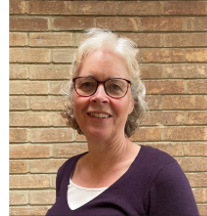
Clinical Lead Dr Katharine Smith
Dr Katharine Smith joined the CRF in 2012
60 seconds with Dr Katharine Smith
Tell us a little about yourself, and what attracted you to working at OH CRF?
I started at OH CRF in 2012. I previously had a varied career as a psychiatrist – I trained in both general adult and older adult psychiatry. I also spent time in clinical research, completing a doctorate and post-doc at the University of Oxford Department of Psychiatry before returning to clinical work as an Older Adult Consultant Psychiatrist at OHFT.
I wanted to work at OH CRF because it combines my interests in clinical psychiatry across all age groups with clinical research and academic activity. The OH CRF is funded by the NIHR and focusses on high-quality, early phase experimental medicine studies in mental and cognitive health. My current role allows me to utilise my experience in clinical research and patient care (via our specialist research clinics for treatment-resistant depression and bipolar disorder), so every day is varied and different!
What is your vision for the team you work with? What are you currently working on?
I am clinical lead for OH CRF as well as Principal investigator (PI) and Chief Investigator for a number of studies using psychedelics.
Currently, I am Principal Investigator (PI) on a new study investigating treatment-resistant depression.
My priorities for the team and our studies is to produce high-quality research that can be used to improve treatment options for people with mental health difficulties in a real-world clinical setting. As clinical lead at OH CRF, I want to ensure we deliver meaningful clinical research to participants in a safe and equitable way.
What does being a section editor at The British Journal of Psychiatry involve? How did you become a section editor?
Section editors support the Editor-in-chief in developing and delivering the editorial strategy of the journal, and also support the journal by handling papers, facilitating peer review and making decisions on allocated manuscripts.
I have recently started in the role and am excited to be working with such an esteemed and supportive team.
The British Journal of Psychiatry (BJPsych) is a leading international peer-reviewed journal which is published monthly on behalf of the Royal College of Psychiatrists, and I feel very privileged to be contributing.
We are actively recruiting for our new study in treatment-resistant depression. I am working with our multidisciplinary team to coordinate this.
I am meeting with the OH CRF Patient and Public Involvement and Engagement (PPIE) lead to plan a presentation due to take place at the upcoming Trust Annual General Meeting (AGM).
I have supervision meetings with our OH-CRF specialty doctors.
In my journey to this role I was fortunate to have amazing teachers and supervisors early in my training who encouraged me to ask careful questions and be thoughtful in my formulations of treatment plans. I was well supported in balancing my earlier career with family commitments, working part-time and having a break to look after my young children before returning to full-time work.
Who or what inspires you?
I work with a fantastic multidisciplinary team of nurses, research assistants and doctors and am motivated by their positive and can-do attitude. The central element of clinical research is our wonderful participants and patients. We can’t move forward and do research without them and I am always inspired by their generosity and willingness to contribute to help others as well as themselves.
If you were not in your job currently, what would you like to be doing?
I have a lot of interests outside work, so I would probably be doing one of those! I love sailing with my family (or anything to do with the sea) and have recently taken up singing again. I’ve moved from soprano to alto in my local 4 part choir, and I’m enjoying the challenge!
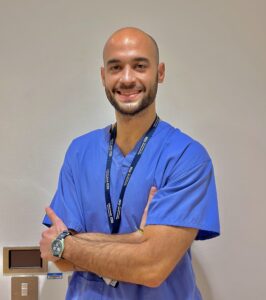
Speciality Doctor Dr Rosario Aronico
Dr Rosario Aronico talks about his placement at OH CRF as a speciality doctor who joined the team from Italy, as part of his Psychiatry Training
60 seconds with Dr Rosario Aronico
What are you studying and where?
I am currently enrolled in the Psychiatry training program at the University of Milan, and I am in the final six months of my clinical training.
How are you settling into your placements at the CRF?
I moved to Oxford in October and began my work at the Clinical Research Facility (CRF) in early November 2023. From the outset, I found the environment incredibly stimulating. The team at the clinic is dedicated to providing high-quality treatments while maintaining a supportive and respectful atmosphere.
What are you focusing on during your time at the CRF?
At the CRF, my primary focus is on clinical trials related to treatment-resistant depression and the use of psychedelic drugs.
How/why you joined the CRF as part of your training placement?
I was well aware of the CRF’s reputation for excellence in Oxford, particularly under the leadership of Prof. Andrea Cipriani.
Last year, during a conversation with my professor and supervisor in Milan, I expressed my interest in clinical trials and evidence synthesis. He therefore facilitated an introduction to Prof. Cipriani, and we agreed that completing the final part of my training at the CRF would be an invaluable opportunity to enhance my clinical research expertise. The journey has been invaluable so far.
What are our plans when you return to Italy?
I am not in a hurry to return to Italy. I am considering spending a few more years abroad to further develop my competencies in clinical research and gain additional experience. The academic environment here has been incredibly inspiring, and I am keen on pursuing a clinical academic career. In the future, I aim to return to Italy with a robust portfolio of expertise and experience.
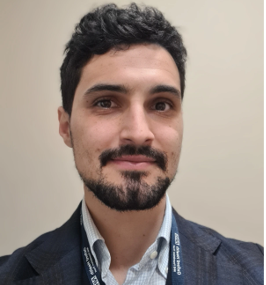
Speciality Doctor Dr Nicola Rizzo Pesci
Dr Nicola Rizzo Pesci studied in Milan and Turin and has joined the team as part of his Psychiatry Training
60 seconds with Dr Nicola Rizzo Pesci
What are you studying and where?
I studied to become a medical doctor in Milan (Italy) and after graduation I moved to Turin, where I am currently in specialty training to become a Psychiatrist.
How are you settling into your placements at the CRF?
I find the work environment at the CRF to be vibrant and supportive. Working on studies involving cutting edge treatments and investigations is exciting and motivating, and other staff members are always available to help.
What are you focusing on during your time at the CRF?
I am involved in delivering study procedures for most of the studies that are carried out in the facility, including studies on dementia, depression, and on the effects of psychedelic drugs
How/why you joined the CRF as part of your training placement?
I was given the opportunity to join the CRF team as part of my last year of training in Italy. I considered this an unparalleled opportunity to diversify my skills, to assimilate a protocol-driven approach to research and to come in contact with pioneering procedures and treatments.
What are our plans when you return to Italy?
When return to Italy I will be a specialist psychiatrist, and I hope to pursue an academic career as well as clinical practice in a University hospital.
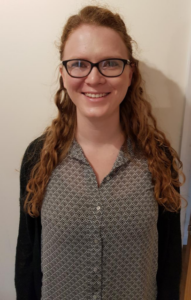
Team Lead Deborah Moll
Debbie Moll, who recently started as the CRF Team Lead, speaks about her career in research
60 seconds with Deborah Moll
Debbie previously worked as a researcher in the Oxford Health NHS Foundation Trust’s Memory and Cognition Research Delivery Team and also worked part-time as OH CRF’s Patient and Public Involvement (PPI) Lead.
Tell us a little about yourself, and what attracted you to working at OH CRF?
I have been working in research delivery for several years. I enjoy this work as it allows me to maintain my clinical skills as well as develop research and academic skills.
I find the studies delivered at OH CRF fascinating as they explore possibilities for new treatments within mental and cognitive health.
My colleagues at OH CRF are fantastic, with everyone coming from different backgrounds to deliver high-quality research, while also supporting the wellbeing of participants and team members. I had been working with the team as the PPI Lead and am looking forward to working with the team more closely and getting to know everyone better.
What will your recent promotion to Team Leader at OH CRF involve?
This role involves leading and line managing a team of research delivery staff at the OH CRF, as well as supporting the management of research delivery and ensuring that research is conducted safely and appropriately.
What is your vision for the team you will work with?
It is important that research delivery staff are supported to deliver high-quality participant-centred research. Inclusivity is also essential for research, to find new treatments that are appropriate for each member of our diverse society.
What will be at the top of your To-Do List?
I will be spending time at OH CRF getting to know the day-to-day research activities as well as staff priorities. We hope to recruit a new Patient and Public Involvement Lead soon and I will be supporting the new candidate into this role.
How did you get to where you are today?
After qualifying as a Speech and Language Therapist, I worked in paediatrics for approximately 3 years. My work focused on post-acute paediatric neurorehabilitation with children recovering from severe acquired brain injury.
While working clinically, I found that there was a lack of research to inform evidence-based decisions, and this influenced my decision to apply for a full-time role in clinical research delivery.
My first research delivery position was at the Royal Berkshire Hospital, primarily in the women and children’s team, then coordinating a large COVID data collection study during the pandemic.
I then joined the Memory and Cognition Research Delivery team at Oxford Health NHS Foundation Trust, and later started my part-time role as the PPI Lead at OH CRF. I really enjoy working with research participants and public contributors, to help people have a positive experience of research and to contribute to the discovery of new treatments.
Who or what inspires you?
The stories of research participants are a huge motivation to me. They share their challenging experiences to help find new treatments for future patients experiencing mental health conditions and/or dementia. Participants have also highlighted the support and care that they receive from research staff, and the huge positive impact this can have on their daily life.
If you were not in your job currently, what would you like to be doing?
I would either be in the sea or on a beach, or playing my violin or viola, or else in front of Netflix with my crochet!

Matron Amanda Colston
Amanda Colston, Matron at OH CRF, speaks about her recent success in being awarded an Oxford Academic Health Partner (OAHP) Research Development Award
An interview with Amanda Colston
Amanda’s role is to oversee the CRF’s dementia studies and the team of research nurses. She received funding from the OAHP Research Development Awards to support her through an MSc in Clinical Research with the School of Pharmacology at Cardiff University.
“I knew I wanted to stay in research, but I want to progress in my career,” says Amanda, who self-funded the first year and returned to the course after a break during the pandemic, where she coordinated the Novavax vaccine study. “Since our CRF works with both commercial and non-commercial partners, this training gives me a much better understanding of drug development, and knowledge of where we are in the cycle. This is great knowledge to have, whether I’m talking to a research participant or a drug company.”
Now in her third year of study, Amanda is undertaking a systematic review of the aftercare needed for patients who receive genetic results as part of a clinical trial. “When we do dementia treatment trials, we will look at biomarkers in the blood to see the likelihood that our participants will develop dementia in the future. They will then be told the results of their test, whether they enter the trial or not.
“Crucially, with this information about their future at hand, our patients will need to be cared for to make sure they are ok. They might need access to a psychiatrist or a counsellor. Yet there hasn’t been any really good research to see what people need, so that’s what I’m looking to find out.”
Amanda was attracted to a career as a research nurse after taking part in a research project when she was an acute nurse in a general hospital.
“It was just fantastic to be at the cutting edge of new treatments and to work with healthy volunteers who give their time just for the benefit of others. In our role as research nurses, we can make a difference not just to the few patients we are working with on any given day, but to the world,” says Amanda, who now finds herself fully immersed in the world of research.
With further study potentially on the horizon, Amanda’s more immediate goal is for the MSc to equip her with a broader knowledge base that her team can call on, as well as giving her the experience to mentor others who are undertaking training.
“Having a level of analysis and overview means you can step back from a situation and consider the best available evidence before developing a study. For patients, they can be confident that the work we do has a good basis in science. It’s such exciting work, I love it!”
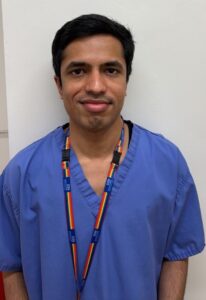
Research Nurse Balaji Rajendran
Balaji Rajendran is a Research Nurse and Pharmacy and Resus Lead at OH CRF
My work in the OH CRF by Balaji Rajendran
On a typical day I start by co-ordinating the shift with the morning handover meeting. I risk assess to confirm that all tasks and clinical visits listed for the day are adequately and appropriately staffed and safe to proceed. I allocate daily tasks and ensure all tasks from the previous day and any other outstanding issues are resolved.
I prepare myself for the clinical visits that I’m booked for, set up the visit room and ensure all risk assessments have been completed before the visit. Throughout the visit, I guide or supervise students or any new staff shadowing visits. At the end of the visit, I discuss the post-visit learning with the person shadowing.
After the visit, as a Pharmacy and Resus lead, I check if there is anything outstanding with Pharmacy and Resus and whether action is required. After this, I focus on the studies I coordinate and complete any admin or respond to relevant emails to the study teams. Following this, I meet with my supervisee and make sure all their goals are achieved and provide support as required.
At the end of the day, I check that tasks delegated in the morning handover have been completed and whether there are any outstanding issues. If there are outstanding issues, depending on the nature of the issue, I try to resolve them or hand over to the next day’s coordinator.
No day is the same as a research nurse, every day is different and offers a new challenge which makes my job Interesting, provides opportunities to learn and something new every day. Hence I find the role very rewarding!

Lab and Sustainability Lead Abigail Stewart
Research scientist, turned staff nurse, turned clinical research nurse
My work in the OH CRF by Abigail Stewart
My role at the Oxford Health NIHR Clinical Research Facility (OH CRF) as a clinical research nurse, lab lead and sustainability co-lead is wonderful because I am able to transfer skills from my previous roles.
As a research nurse at the OH CRF I work across our studies to conduct visits and assist with delivery of our trials. This includes administering medication via injections and infusions, facilitating lumbar punctures and collecting samples for analysis. I oversee co-ordination of our Dementia studies portfolio with a particular focus on studies involving the administration of a vaccine to slow the progress of Alzheimer’s disease and upon phenotyping to identify early biomarkers of Alzheimer’s disease.
My role as co-lead for sustainability has also allowed me to channel my passion for care of our environment into the clinical research environment. We have developed and implemented a green plan to reduce the carbon footprint of research at the OH CRF in addition to our Surplus project which promotes the repurposing of no-longer-required research equipment for charity (non-expired items) or training (expired items). This has seen a significant reduction in research waste since implementation of the project.
As lab-lead, my job is to keep our lab running safely and efficiently to facilitate the delivery of our trials. Over the last eighteen months, I have overseen the development of a new lab at the OH CRF. Our old lab was too small to meet the demands of all the trials we wanted to run so we have designed and had built a lab that has tripled our size and capacity to deliver clinical trials in mental health. Our new lab is equipped with top of the range centrifuges, microbiological safety cabinets, a cell counter and -80 storage facilities. Watch this space to see what we expand into in the future!
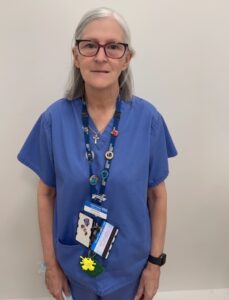
Senior Administrator Val Paulley
Here we get an insight into a typical day at the CRF for senior administrator and valued team member Val Paulley
My work in the OH CRF by Val Paulley
I start my day by unlocking the CRF and make sure everything is in place for the day.
I put on the white board the days visits and who will be involved in the visits.
I log onto my laptop and check my many emails.
Just before the morning handover I greet the CRF staff with a smile and hear all about their exciting evenings.
I deal with not only my emails but the emails for the CRF, Treatment Resistant Depression (TRD) clinic and Bipolar clinic. I also manage the diaries for the clinical leads for these clinics (1000 emails later a few cups of coffee are needed)
I am also responsible for all the study booking at the CRF which means I work closely with the University staff.
Fast forward to 15:30 I’m on my second load of scrub laundry, and the end of the day is in sight.
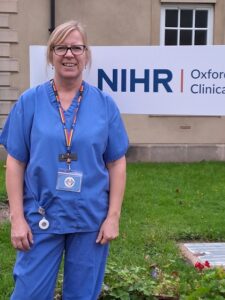
Clinical Research Nurse Alison Newton
A conversation with OH CRF Clinical Research Nurse Alison Newton about her current role and how she got here
My path into Research Nursing by Alison Newton
I have enjoyed a long background in physical health nursing, predominantly in Oxfordshire, working in the community starting as a District Nurse Team Leader where I completed my degree as a Specialist Practitioner in the Home.
More recently I worked as a Falls Specialist Clinical lead with a smaller more specialist team, ensuring patients over 65 years who had fallen across Oxfordshire received a high-quality assessment, treatment and intervention in accordance with NICE guidance. This role fulfilled my thirst for acquiring new knowledge, and I successfully completed the frailty masters module Advancing Competence in Community Physical Assessment, learning new skills to apply to my clinical assessment.
With my semi-retirement looming and not quite ready to hang up my hat, I contacted the OHFT Research and Development team keen to learn more about Research Nurse roles.
My enquiry ended up in Amanda Colston’s inbox, Team Lead at the Clinical Research Facility (CRF). She invited me to join the team and shadow a shift with one of the more experienced Research Nurses in the Memory and Cognition Team working at the CRF on the Novovax vaccine trial.
I was excited to learn more about the role of the Clinical Research Nurse, a role I had no previous knowledge or experience of despite a 30+ year career within the NHS.
I really enjoyed my shift; all my questions were answered, and I discovered a real passion for research. When Amanda invited me to take a part time job at the CRF I was delighted!
What I do day2day.
As I was getting to grips with my new role, I had the opportunity to work remotely on the PANORAMIC trial, a collective of GP hubs across the Thames Valley and South Midlands Clinical Research Network.
The study was trialing the antiviral drug Molnupiravir to see whether it reduced the severity of symptoms experienced with Covid 19. I was involved with screening, gaining consent and randomising participants with a team of other nurses across the regions. The training was extensive but very positive for me.
Transitioning from a physical health nurse to a research nurse in mental health was daunting. I had cared for numerous patients with Depression and Dementia, other mental health disorders were new to me.
It has been a huge learning curve, however many of my advanced nursing skills have been transferable, and there is always ongoing support plus access to a variety of in-house training. The Clinical Research Facility work in partnership with Oxford University Department of Psychiatry and as a result we are able to access their training resources regularly too.
Day to day I help to coordinate the PAX-D trial with the study team at the University of Oxford where participants with treatment resistant depression are recruited to receive the trial drug Pramipexole or a placebo to help improve their motivation, which commonly reduces in this disorder. There are about 10-12 other early-stage experimental trials currently running and ten are in the set-up process. The ABATE trial is a great example of cutting-edge research, administering a vaccine to see whether it helps to slow the progression of Alzheimer’s.
As a Clinical Research Nurse, I work alongside doctors, Research assistants, Administrators and nursing assistants to ensure participants remains safe throughout trials. I obtain samples including taking safety and research bloods, assist with lumbar punctures, carry out ECG’s, vital signs, checking urine for pregnancy and drugs (exclusion criteria), conducting rating scales, ensuring protocols are followed, dispensing trial medications, including intravenous drugs and more. At the same time supervising Student Nurses, Nurse Associate Trainees and Nurse Cadets.
No two days are the same with so many different trials running which makes it such an exciting and interesting place to work.
Personal Commitment and Achievement
With colleagues I am currently involved with a Quality Improvement programme at the CRF to reduce cost and improve sustainability. I am also assisting with a national pilot for mental health nursing students supported by the National Institute for Health Research giving students a broad introduction to research during their placements with the aim of demystify the role whilst encouraging nurses to become more research active!
I was also excited to have received a nomination for the Research Nurse of the Year award at this year’s Thames Valley Health Research Awards, which marks the achievements of staff who support the work of the NIHR Clinical Research Network Thames Valley and South Midlands.
I can work flexibly and still use my nursing skills. I feel lucky to have found such a supportive and diverse team to work with. I would encourage other nurses to step outside of their comfort zone and try something new, you may be pleasantly surprised at how quickly you can adapt!
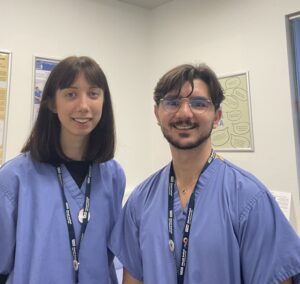
Clinical Research Assistants Emma Why and Ronnie Alecio
Ronnie and Emma tell us more about their career path so far and their experiences as new starters:
Our journey as new Research Assistants
Emma Why
Having completed my BA in psychology in 2022 I went on to work in mental health services, providing psychological interventions, both one-to-one and in therapeutic group settings, to support individuals experiencing mental health difficulties.
My long-term aspiration is to apply for the Clinical Psychology Doctorate.
Having been involved in the delivery of evidence-based interventions, I have a profound interest in and appreciation for the potential of research outcomes to shape and improve clinical practice in mental health, which is why a research-focussed role at the CRF appealed to me.
This role has given me the opportunity refine and develop my clinical skills through my work with participants, while also gaining new competencies in research delivery.
During my induction period at OH CRF, I’ve enjoyed learning about the diverse range of studies being delivered at our site and have been focussed on completing study specific training for cognitive and dementia studies, including administering cognitive assessments and rating scales. I’m looking forward to continuing my lab training, particularly sample processing, as well as completing phlebotomy training. As I develop in my role I hope to eventually be involved in the coordination of ongoing and future studies.
I’m so grateful to my CRF colleagues whose warmth and support have made settling into this role such a positive experience.
Ronnie Alecio
I joined the OH CRF as a clinical research assistant just over two months ago. It’s very early days for me, but I’m very excited to form part of, and contribute to, such high quality evidenced based mental health research. After research postgrads in neuroscience at King’s IOPPN and later a Psychology MSc, I thought I’d marry my interest in patient-centred clinical interventions and academic research with this role at the CRF.
Over the last 8 weeks I’ve been focusing on training and getting to grips with the protocols of the wide-ranging studies we are currently running. One thing I am looking forward to is coordinating the lifecycle of a clinical trial at the CRF; from study set-up to completion, perhaps seeing more studies that include neurodivergent populations.
One of the highlights at the CRF is the staff. My colleagues are the most supportive, committed, diligent and caring team of scientists I’ve ever had the chance to work with. They really are an inspiring bunch and truly embody the call to be Safe, Caring and Excellent.
There is no definitive goal in sight for me, but whatever I do, I want to continue my commitment to breaking down barriers in mental health.
